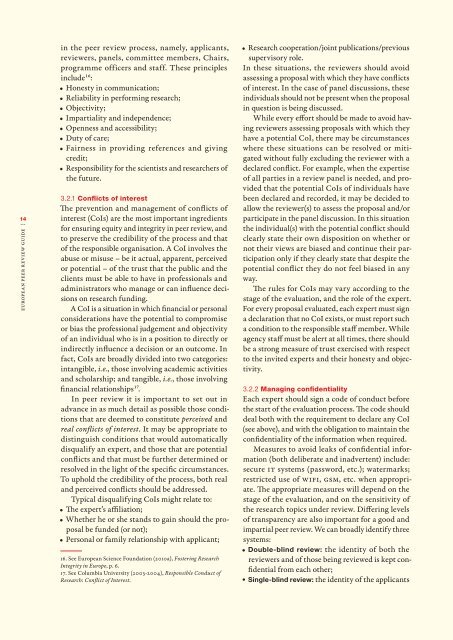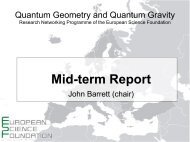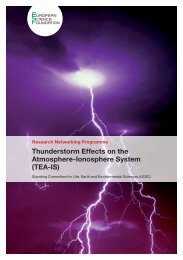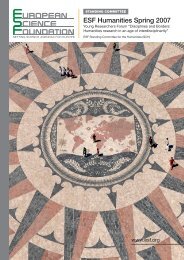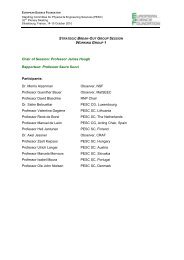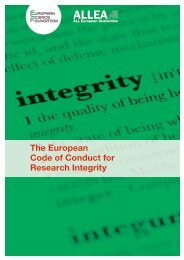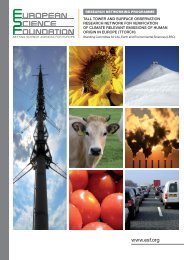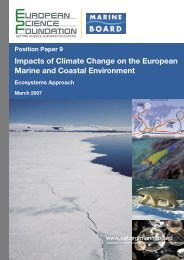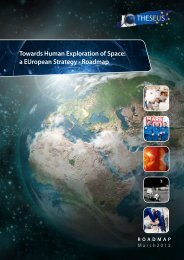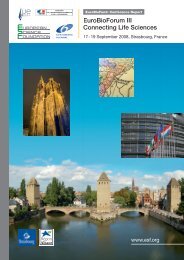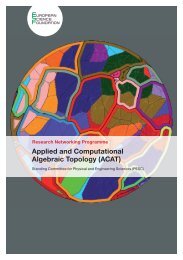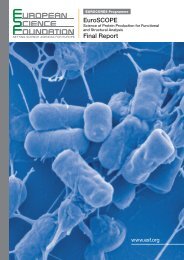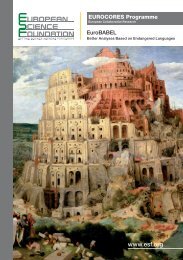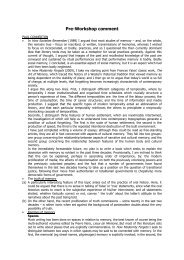European Peer Review Guide - European Science Foundation
European Peer Review Guide - European Science Foundation
European Peer Review Guide - European Science Foundation
You also want an ePaper? Increase the reach of your titles
YUMPU automatically turns print PDFs into web optimized ePapers that Google loves.
14<br />
<strong>European</strong> <strong>Peer</strong> <strong>Review</strong> <strong>Guide</strong><br />
in the peer review process, namely, applicants,<br />
reviewers, panels, committee members, Chairs,<br />
programme officers and staff. These principles<br />
include16:<br />
• Honesty in communication;<br />
• Reliability in performing research;<br />
• Objectivity;<br />
• Impartiality and independence;<br />
• Openness and accessibility;<br />
• Duty of care;<br />
• Fairness in providing references and giving<br />
credit;<br />
• Responsibility for the scientists and researchers of<br />
the future.<br />
3.2.1 Conflicts of interest<br />
The prevention and management of conflicts of<br />
interest (CoIs) are the most important ingredients<br />
for ensuring equity and integrity in peer review, and<br />
to preserve the credibility of the process and that<br />
of the responsible organisation. A CoI involves the<br />
abuse or misuse – be it actual, apparent, perceived<br />
or potential – of the trust that the public and the<br />
clients must be able to have in professionals and<br />
administrators who manage or can influence decisions<br />
on research funding.<br />
A CoI is a situation in which financial or personal<br />
considerations have the potential to compromise<br />
or bias the professional judgement and objectivity<br />
of an individual who is in a position to directly or<br />
indirectly influence a decision or an outcome. In<br />
fact, CoIs are broadly divided into two categories:<br />
intangible, i.e., those involving academic activities<br />
and scholarship; and tangible, i.e., those involving<br />
financial relationships17.<br />
In peer review it is important to set out in<br />
advance in as much detail as possible those conditions<br />
that are deemed to constitute perceived and<br />
real conflicts of interest. It may be appropriate to<br />
distinguish conditions that would automatically<br />
disqualify an expert, and those that are potential<br />
conflicts and that must be further determined or<br />
resolved in the light of the specific circumstances.<br />
To uphold the credibility of the process, both real<br />
and perceived conflicts should be addressed.<br />
Typical disqualifying CoIs might relate to:<br />
• The expert’s affiliation;<br />
• Whether he or she stands to gain should the proposal<br />
be funded (or not);<br />
• Personal or family relationship with applicant;<br />
16. See <strong>European</strong> <strong>Science</strong> <strong>Foundation</strong> (2010a), Fostering Research<br />
Integrity in Europe, p. 6.<br />
17. See Columbia University (2003-2004), Responsible Conduct of<br />
Research: Conflict of Interest.<br />
• Research cooperation/joint publications/previous<br />
supervisory role.<br />
In these situations, the reviewers should avoid<br />
assessing a proposal with which they have conflicts<br />
of interest. In the case of panel discussions, these<br />
individuals should not be present when the proposal<br />
in question is being discussed.<br />
While every effort should be made to avoid having<br />
reviewers assessing proposals with which they<br />
have a potential CoI, there may be circumstances<br />
where these situations can be resolved or mitigated<br />
without fully excluding the reviewer with a<br />
declared conflict. For example, when the expertise<br />
of all parties in a review panel is needed, and provided<br />
that the potential CoIs of individuals have<br />
been declared and recorded, it may be decided to<br />
allow the reviewer(s) to assess the proposal and/or<br />
participate in the panel discussion. In this situation<br />
the individual(s) with the potential conflict should<br />
clearly state their own disposition on whether or<br />
not their views are biased and continue their participation<br />
only if they clearly state that despite the<br />
potential conflict they do not feel biased in any<br />
way.<br />
The rules for CoIs may vary according to the<br />
stage of the evaluation, and the role of the expert.<br />
For every proposal evaluated, each expert must sign<br />
a declaration that no CoI exists, or must report such<br />
a condition to the responsible staff member. While<br />
agency staff must be alert at all times, there should<br />
be a strong measure of trust exercised with respect<br />
to the invited experts and their honesty and objectivity.<br />
3.2.2 Managing confidentiality<br />
Each expert should sign a code of conduct before<br />
the start of the evaluation process. The code should<br />
deal both with the requirement to declare any CoI<br />
(see above), and with the obligation to maintain the<br />
confidentiality of the information when required.<br />
Measures to avoid leaks of confidential information<br />
(both deliberate and inadvertent) include:<br />
secure IT systems (password, etc.); watermarks;<br />
restricted use of WIFI, GSM, etc. when appropriate.<br />
The appropriate measures will depend on the<br />
stage of the evaluation, and on the sensitivity of<br />
the research topics under review. Differing levels<br />
of transparency are also important for a good and<br />
impartial peer review. We can broadly identify three<br />
systems:<br />
• Double-blind review: the identity of both the<br />
reviewers and of those being reviewed is kept confidential<br />
from each other;<br />
• Single-blind review: the identity of the applicants


